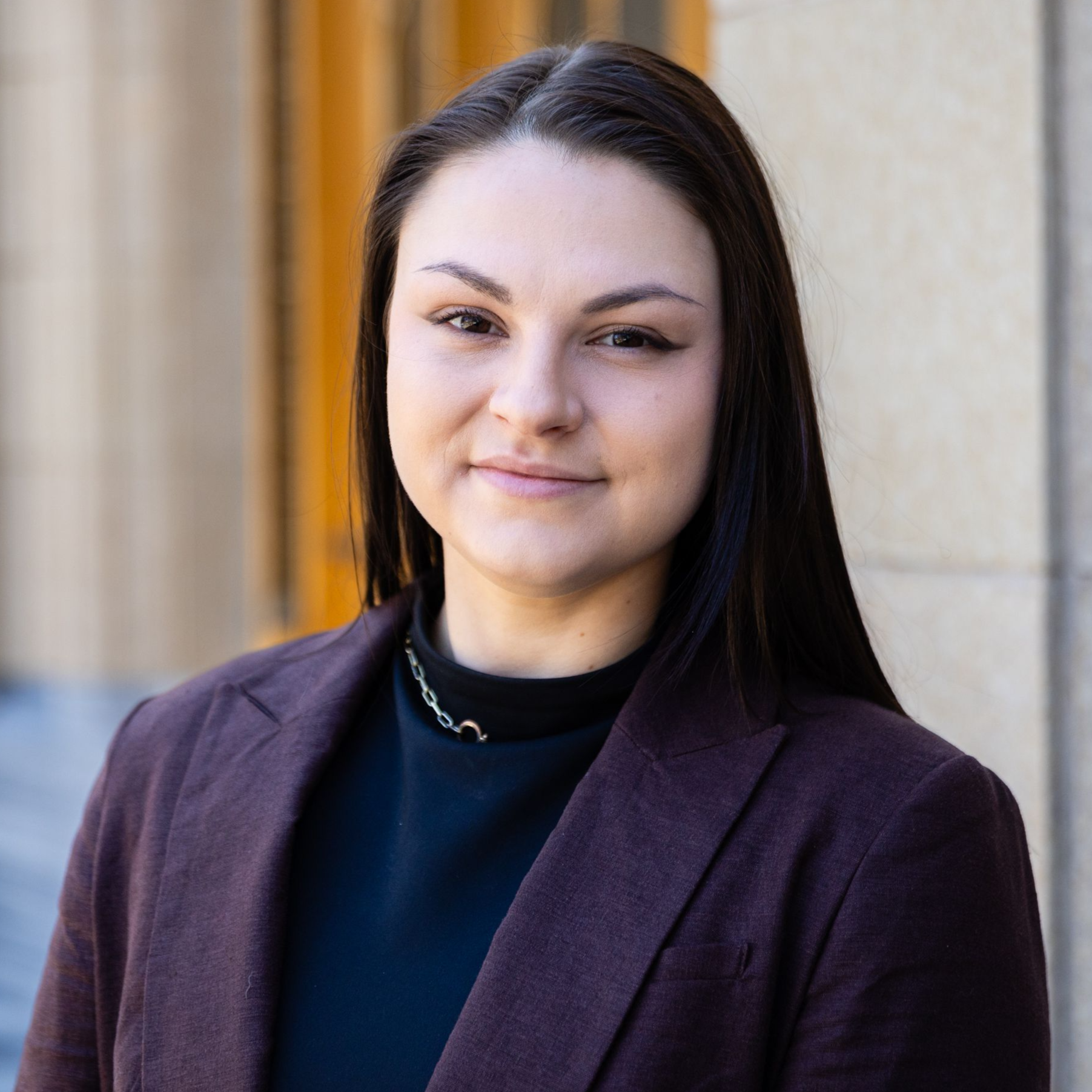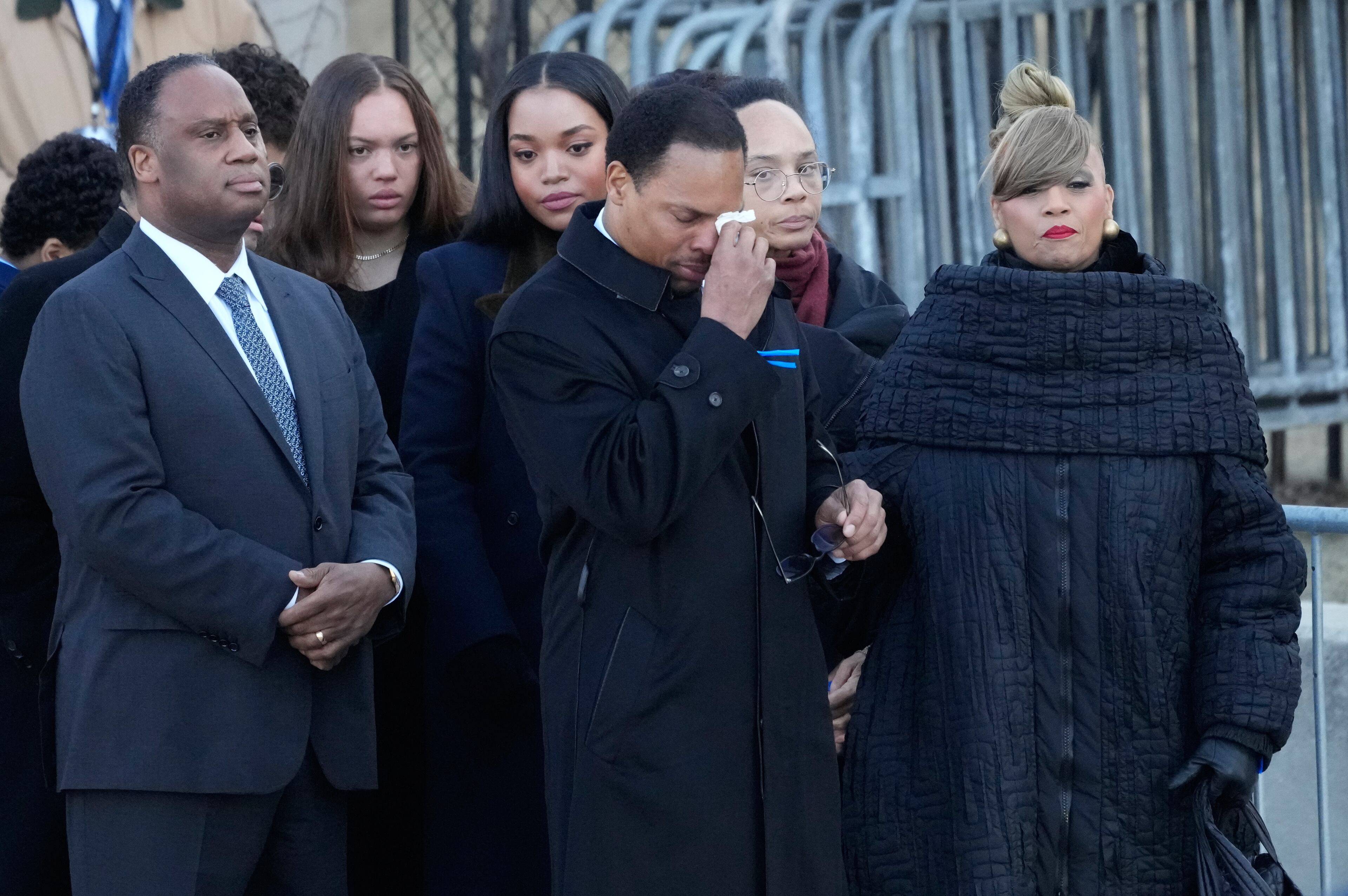The rise and reign of Atlanta’s Black mayors

The year 1974 marked a historic shift in the leadership of Atlanta when Maynard Jackson became the city’s first Black mayor.
Following a decades-long exodus of white residents to the northern suburbs, the 1970 census revealed Atlanta had a majority Black population for the first time in the city’s history, and now it had a mayor to reflect that.

Jackson laid the groundwork for a succession of Black mayors who followed in his footsteps. Each of those mayors have faced unique challenges during their terms, and the scope of their accomplishments vary. But they all left behind indelible marks on the city and continue to shape its future.
For Black History Month, The Atlanta Journal-Constitution sat down with five of Atlanta’s six living Black mayors to talk about the roles they played in the evolution of our city.

THE TRAILBLAZER
Maynard Jackson | 1974-1982 and 1990-1994
The first of Atlanta’s long line of Black mayors’ entry into public service was born out of regret.
When the Rev. Martin Luther King Jr. was shot and killed while standing on his room’s balcony at the Lorraine Motel on April 4, 1968, Maynard Holbrook Jackson Jr. was overcome by emotion.
The trigger of the Remington-Peters that killed the civil rights leader was pulled just after Jackson’s daughter, Brooke, was born, and he went from celebrating the birth of his child to mourning the civil rights icon’s death.
Born in Dallas, Texas, in 1938, Jackson moved to Atlanta at age 8 and grew up under the tutelage of his grandfather, John Wesley Dobbs, the unofficial mayor of Sweet Auburn and founder of the Georgia Voters League. Dobbs led the bloodline of an influential, progressive-thinking family and ― sometimes under the cover of night ― helped lay the groundwork for the rise of Black political power in the South.
Jackson, who graduated from Morehouse College at 18 and went on to study law in Boston and Durham, North Carolina, missed crucial moments in the modern Civil Rights Movement.
He didn’t sit side-by-side with HBCU student activists Lonnie King and Julian Bond, who, in March 1960, launched a series of sit-ins at lunch counters to protest segregation in Atlanta.
When thousands of youth in Birmingham, Alabama, launched the Children’s Crusade in May 1963, Jackson watched from afar as children were blasted with fire hoses, clubbed by police officers and attacked by dogs.
He peddled encyclopedias door-to-door for the P.F. Collier Company in Boston to pay his way through law school. He trudged through the summer heat and the winter chill trying to convince poor Black residents to invest in their education.

His first foray into public service was an unsuccessful bid for the U.S. Senate in 1968 that revealed a strong following in Atlanta. When he ran for mayor in 1973, he won nearly 60% of the vote. As he declared victory at the Sheraton-Biltmore Hotel, Jackson promised Atlanta’s Black families a better future.
With his election, 35-year-old Jackson ushered in the next, crucial step of the Civil Rights Movement: winning elected seats in office.
By not conferring with Atlanta’s kingmakers before he ran and bypassing the good ol’ boy network, he sent a loud message: Get on board, or get out of the way. Even his inauguration shattered norms. He skipped the traditional City Hall ceremony for an extravagant gala at the Civic Center, where thousands of people came to watch.
During his 12 years as the city’s leader, Jackson spearheaded a political, economic and cultural revolution that hinged on mending strained race relations and building Atlanta’s reputation as a Black mecca.

The power balance of Atlanta’s elected positions was shifting dramatically when Jackson took office. The city charter was changed to strengthen the mayor’s authority, giving Atlanta’s first Black leader unprecedented power.
He used that power to execute what is hailed as one of his greatest successes: increasing Black wealth through bolstering minority business contracts with the city ― especially at Hartsfield-Jackson International Airport, what former Mayor Shirley Franklin calls “the goose that laid the golden egg” for the economic success it has brought to the city. Before Jackson took office, Black businesses held less than 1% of government contracts.
But Jackson wasn’t immune to criticism. He faced scrutiny during the Atlanta child murders of 1979-1981, when the parents of victims and young Black children said he wasn’t doing enough.
Some white residents accused him of “going too far, too fast and being too Black,” Jackson said — like when he demanded Atlanta banks add Black members to their boards in order to keep doing business with the city.
After his second term, which ended in 1982, Jackson pursued a business venture in Chicago, but due to what he perceived as the fragile nature of what he had built, he returned to Atlanta politics to run for a historic third term, winning by a landslide in 1989.
Jackson, who died in 2003 at age 65, created the mold for other Black mayors. Half a century later, it is still seen by many as the gold standard for city leadership — both in Atlanta and across the country.

THE DIPLOMAT
Andrew Young | 1982-1990
Growing up in New Orleans, Andrew Young was a fast runner, and it bothered him that he couldn’t compete in Sunday track meets in the city park. Black students weren’t allowed in the segregated space.
But his father taught him: Don’t get mad, get smart. So Young got hold of a stopwatch and competed against imaginary opponents as his kid brother, Walter, called out his times.
One day his father took him to the movie theater to watch U.S. track star Jesse Owens win the gold medal in the 100-meter dash during the 1936 Olympics in Berlin under the gaze of Adolf Hitler. Despite the dictator’s ire, Owen went on to win three more races.
You see what Jesse did? Young’s father asked.
The Olympian’s silent protest through success served as a lifelong model for Young, who learned at a young age that losing his temper over injustices wouldn’t get you far. Decades later he would impart that same wisdom to young Black men who found themselves on the front lines of the Civil Rights Movement.
“I learned to make friends with people instead of fighting, and it shaped my whole life,” said Young, speaking from his Midtown office surrounded by memorabilia from a life devoted to public service, including the 1996 Olympic torch.
Young’s father wanted his son to become a dentist, but Andrew Young chose a different path. After graduating from Howard University and then seminary, he became a preacher.

At the request of political activist John Wesley Dobbs, Maynard Jackson’s grandfather, Andrew ran a voter registration drive out of his church in Thomasville. It was his early involvement in cultivating Black political power that cemented him as a key ally to the Rev. Martin Luther King Jr.
Young had a knack for talking people off the edge — from the sheriff’s deputy who stood guard outside King’s jail cell in Albany to a group of panicked Black teenagers being loaded into the back of a blisteringly hot police van in Savannah.
“They want you to lash out,” he recalled telling the three dozen demonstrators who were squeezed together in the vehicle. “Don’t give them the satisfaction.”
Young’s level head and ability to make friends was valuable to the cause. The night before King’s fatal trip to Memphis, he confided in Young that the movement needed a different strategy.
We can’t keep lining up 1,000 people to march just for the right to buy a cheese sandwich at the soda shop, King told his confidants. We need to elect people that will pass bills to protect our rights.
Everyone ― except Young ― agreed he should run for Congress. In 1972 he became the first African American elected in Georgia to the U.S. Congress since Reconstruction. His ability to make friends nationally and across the globe propelled him from his seat on the House floor to ambassador to the United Nations in 1977.
Young’s Midtown office was quiet on the Tuesday afternoon following his return from the nation’s capital where the 92-year-old delivered a homily for his friend, former President Jimmy Carter, from beside his flag-draped casket at the Washington National Cathedral.
Carter, who appointed Young ambassador, knew his strength was his ability to work across the aisle. The pair had something in common: compassion. Despite their differences in background, they were both praised for seeking common ground in politics.
With his second mayoral term coming to an end, Jackson encouraged Young to come home and run for mayor “because it was very important that we not go back on the progress that Maynard made,” said Young, “and the progress that he made was controversial.”
Knowing President Ronald Reagan was gearing up to slash federal funds from local governments, Young was hesitant to be mayor. But just like he did as a young boy blocked from running in track meets, Young found a solution.
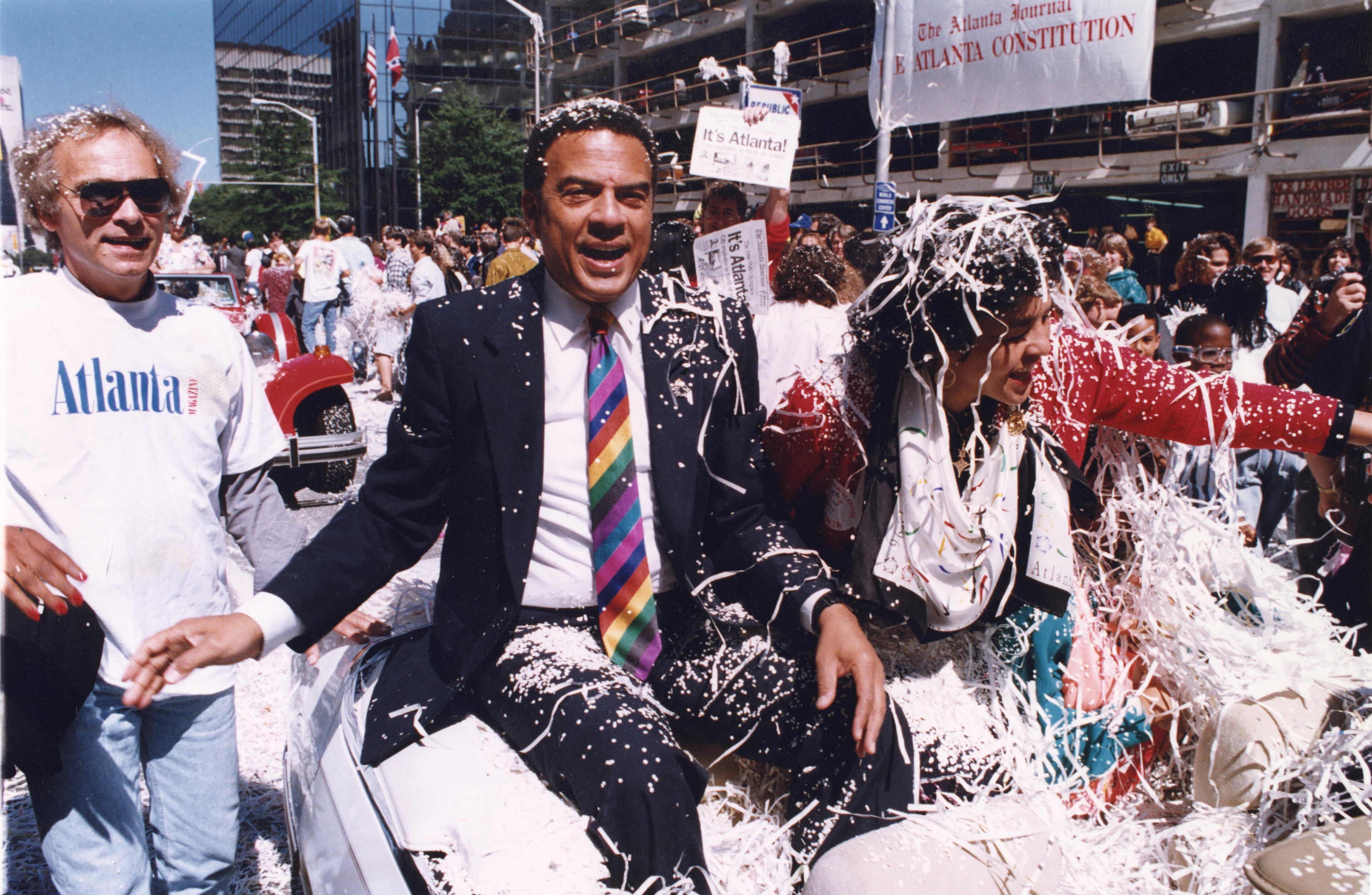
As mayor, he used his international connections to bring foreign business to Atlanta, attracting more than 1,000 new businesses and $70 billion in foreign investment.
Critics condemned his frequent globe-trotting while in office, and seemed unaware that his international relations would be a major catalyst in Atlanta hosting the 1996 Summer Olympics.
The ambassador’s talent for making friends across the world propelled Atlanta into gold status for new investment and set the stage for the city’s political leaders to work hand-in-hand with the international business community.

THE DEFENDANT
Bill Campbell | 1994-2002
For years after former Atlanta Mayor Bill Campbell left office, it was rare to see him out and about, let alone rubbing elbows with prominent politicians still leading the city.
But last winter, as Atlanta’s former mayors gathered under the glass atrium at City Hall to celebrate Maynard Jackson’s life and legacy, Campbell took to the mic.
“There’s an old saying you should never meet your heroes, because you’d be disappointed ― well, that’s certainly not true here,” said Campbell, 72. “I came to Atlanta, as many of us did, because of Maynard Jackson. He just represented something bigger and better than anything else, anywhere else in government.”
Campbell was thrust into the battle for equal rights at a young age. He was 7 years old in 1960 when he became the first Black student to integrate the schools in Raleigh, North Carolina. Years later he described the segregated school as “an ugly place” and a “cauldron of racism and hatred.” But Campbell’s parents thought it was important he stand up against injustice. It was a trademark of their family.
His brother Ralph was the first Black official in North Carolina to hold statewide elected office as the state auditor, and his father, who was president of the local NAACP, believed the voting booth was the only place white and Black residents held equal power.

As a member of the Atlanta City Council, Campbell served as Jackson’s floor leader. He knew when he took office as mayor in 1994 he had enormous shoes to fill.
As mayor, he led a diverse Cabinet and boasted an administration with more Black women serving in top roles than any before him. Charming and magnetic, he was eyed by the Democratic Party for a national position, possibly even a vice presidential pick.
With the Olympics coming two years after he took office, Campbell successfully spearheaded a massive $149 million bond to pay for infrastructure improvements ahead of the Games.
Despite the tragedy of the Centennial Olympic Park bombing that killed one person and injured more than 100 others, the Games cemented Atlanta as a top choice for hosting major national and international events. More than 8.3 million tickets were sold — a record only surpassed in 2024 by the Summer Games in Paris that sold 12 million tickets.
But Campbell had issues closer to home that needed his immediate attention. The first year he was in office, a 2-year-old child in the Herman E. Perry Homes — a public-housing project made up of 1,100 units home to Black families — died after choking on a cockroach.
Campbell’s most important challenge was to overhaul the city’s public housing from one of the worst in the country. In 1994, the U.S. Department of Housing and Urban Development gave Atlanta’s public housing management a score of 39 out of 100. By the time Campbell left office it scored 100.

Among his critics were those who scorned him for his handling of Freaknik 1995, the long-standing HBCU spring break party, which resulted in mass arrests of young people and a citywide traffic jam. Black residents said by cracking down on the event he was trampling on tradition. Campbell had to survey the scene by helicopter because Atlanta’s roadways were impassable.
But Campbell, who declined to be interviewed for this story, had bigger obstacles. His two terms in office were marred by a corruption scandal when federal investigators began handing out charges for a pay-to-play bribery scheme for city contracts.
Ten former city officials and contractors pleaded guilty before a grand jury indicted Campbell in 2004, more than two years after he left office. A jury convicted him on tax-evasion charges in 2006, and he was sentenced to 30 months in federal prison, but he was acquitted of corruption charges.
Atlanta’s first Black mayors fought for political power when racism was still deeply entrenched in government on both a local and national scale. Those who succeeded them in modern times say they inherited an unspoken mission to balance the city’s progress while protecting Atlanta’s roots.

THE PROTÉGÉ
Shirley Franklin | 2002-2010
At the March on Washington in 1963, 18-year-old Shirley Franklin stood shoulder to shoulder with her mother, aunts and cousins as they craned their necks to get a better view of civil rights icons taking the stage in front of them.
The Philadelphia native, who was about to start her first year at Howard University, joined roughly 250,000 people gathered on National Mall to hear the Rev. Martin Luther King Jr. and his closest confidants, like Andrew Young and John Lewis, speak about freedom and equality. A sense of hope and opportunity radiated from the crowd.
Five years later, while interning for the U.S. Department of Labor, she was on assignment in Atlanta when King was killed in Memphis.
Standing on the crowded sidewalk outside of Ebenezer Baptist Church during the funeral, she saw Young again. Both times Franklin sensed she was witnessing benchmarks in American history and her own formative years. Little did she know then, she would one day go on to work on Young’s administration, as well as Jackson’s, and would succeed them both in office.

Franklin wasn’t looking for a job when Jackson appointed her Commissioner of Cultural Affairs. The mayor wanted to use government to strengthen the city’s arts and culture scenes.
She describes her mentor as being “very, very, very difficult to work for,” but he was young, bold and full of ideas. The pair often clashed during closed-door Cabinet meetings. But her strong-headedness didn’t hold her back. She went on to hold a top position in Young’s administration.
Happy to work behind the scenes, Franklin never saw herself as a leader. She faced an almost debilitating fear of failure. But her political predecessors were eager to pass the mayorship to her at the turn of the century, a time when they were worried the Black political power they’d built in Atlanta was in jeopardy.
Jackson, who was well-known for his stubbornness, told her if she wasn’t going to run, step aside.
A year of therapy convinced Franklin to run for office in 2001 ― that and an intimate lunch with a group of her most trusted female allies who pressed her to launch a campaign. They saw something in her that she struggled to see herself.
Unfamiliar with the spotlight, Franklin was coached during her first campaign on how to speak and what to wear, including 3-inch heels to boost her height.

She was victorious ― barely. Franklin won 50.01% of the vote in her first bid for mayor, a stark contrast to the more than 90% when she was reelected for a second term.
In her first weeks in office, she did what she considers the hardest thing she had to do as mayor: She told 1,000 city employees they were out of a job. They hadn’t done anything wrong, the city was facing a massive economic shortfall. Her advisers couldn’t give her an exact number; estimates ranged from a $40 million to $100 million deficit on the city’s $400 million budget. She hiked property taxes and took a 30% cut on her own salary for her first two years in office.
Speaking from her living room, surrounded by carefully curated walls filled with African art and a photo of her beaming beside former President Barack Obama above the fireplace, Franklin, 79, considered her legacy.
“I have a theory about legacy, which is, if you have to talk about it, you don’t have much of a legacy,” she said.

She is best known as the “sewer mayor” ― a title she gave herself while taking on Atlanta’s combined sewer and water system.
When she took office, the city’s population had outgrown its crumbling infrastructure, parts of which dated back to the 1860s, and the city was routinely fined by the federal government for violating clean water standards. In 2002, Franklin spearheaded a $4 billion overhaul of the dilapidated system.
And, although she initially resisted the project, Franklin’s administration also launched development of Atlanta’s iconic Beltline.
Today, Franklin is praised for her continued work behind the scenes after she left office. She is known for having a soft spot for young Atlantans and helping raise funds for high school students to go to college.
Current Mayor Andre Dickens — who was close friends with Franklin’s son, Cabral Franklin, who died in 2015 — seeks her counsel regularly, and she doesn’t think twice before calling up local officials if she disagrees with something they said in the news.
“My job as mayor was to be sure that the door was open for another woman,” she said. “The key was to govern in a way, to lead in a way that someone like me ― who didn’t have a finance background, did not have a history in civil rights, was not a national figure ― could be mayor.”
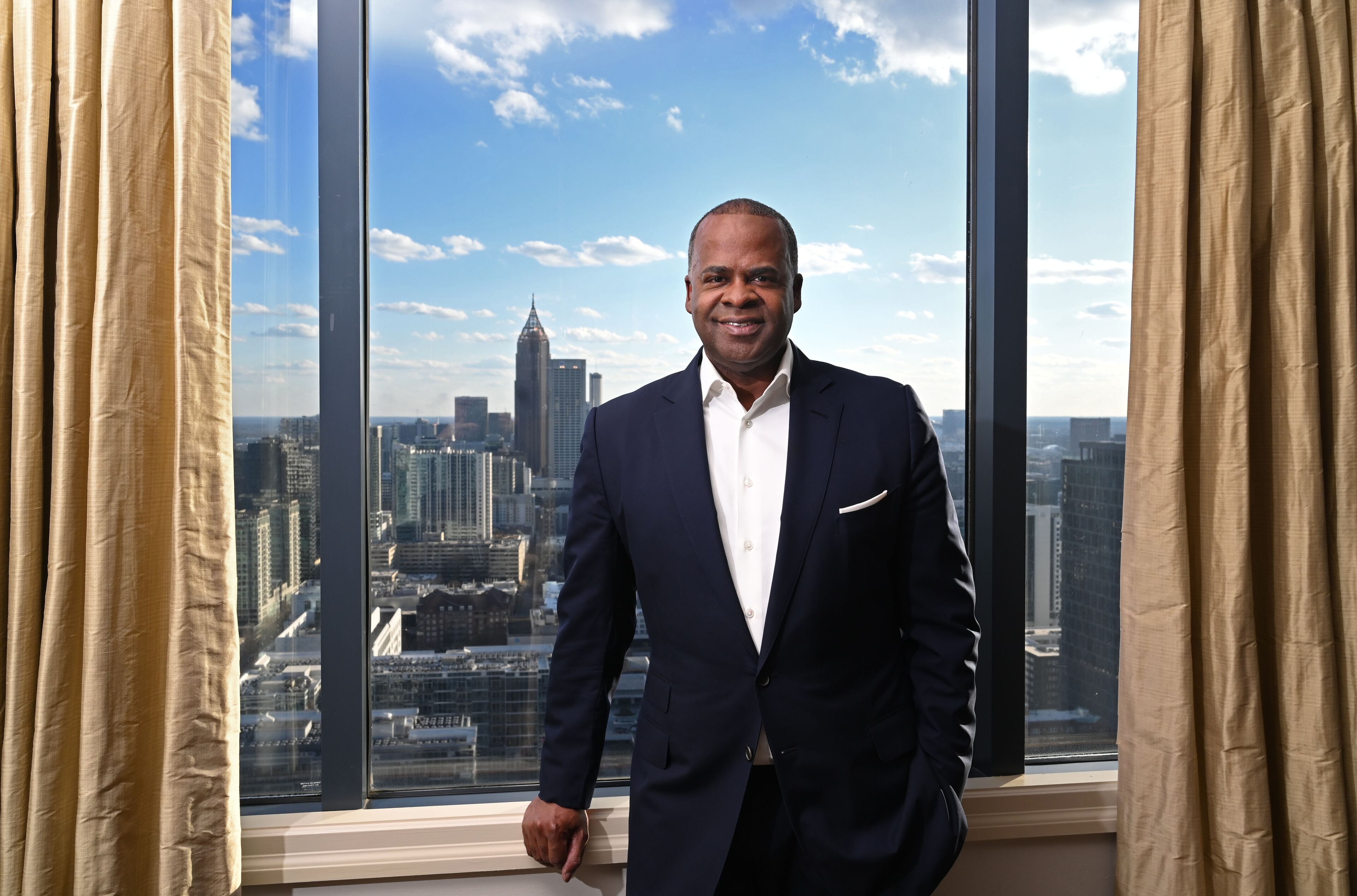
THE ENTREPRENEUR
Kasim Reed | 2010-2018
When Mohammed Kasim Reed was a child, Atlanta seemed like a place where anybody could build their dreams. He describes the city in the ‘60s and ‘70s as a land of opportunity for Black residents who were looking for a “fair shot and a fair shake.”
Dressed in a dark suit and white button-up shirt delicately embroidered with his monogram, Reed, 55, spoke from his condo on one of the topmost floors of the Four Seasons hotel in Midtown where he gazed across the city skyline dotted with projects he had a hand in bringing to life.
“A person that has a high school diploma can start working at a hotel ― at a very low level ― and through work and sweat and initiative, can run a hotel,” he said. “In fact, they can run multiple hotels.”
That kind of entrepreneurial mindset propelled a teenage Reed to earn tens of thousands of dollars running his own gold jewelry business to pay his way through Howard University.

Reed’s intense drive ― a trait he credits to his father ― prompted him to create opportunities for himself, like the time when the brash young college student switched name plates at a Howard University Board of Trustees breakfast so he’d be seated next to Andrew Young. It marked the beginning of a long friendship between the men. It was Young who urged Reed to stay in Atlanta rather than take a job in New York.
After college, Reed practiced law and for 11 years served under the Gold Dome in the Georgia General Assembly, but it was running both of former Mayor Shirley Franklin’s campaigns that served as a launchpad for his bid for Atlanta’s most powerful position.
Reed barely edged out his opponent by 714 votes and began his term in office in 2010. His tenure coincided with the city’s struggle to regain its footing from the 2008 housing crisis. At the same time, a wave of break-ins left Atlantans feeling unsafe in the homes many were barely able to afford.

To tackle the issues, Reed hired hundreds of police officers to create the largest police force in the city’s history at 2,000 sworn members. The annual number of felony crimes dropped to 34,500 incidents in 2012, the lowest since 1969. (Felony crimes peaked in 1989 with 88,000 incidents.)
And he spearheaded massive tourism projects — like the $1.6 billion Mercedes-Benz Stadium, the redevelopment of Turner Field by Georgia State University and iconic retail developments such as Ponce City Market — he understood that keeping the city’s hotels full also meant its coffers were full.
Reed is known as a cutthroat strategist who isn’t afraid to sling mud to get his way. His confidence could quickly devolve into combativeness, and critics accused him of using the mayorship as a bully pulpit to aggressively push his agenda. While mayor, he kept a purple Post-it note inside his desk with a dozen or so names of his most loyal allies.
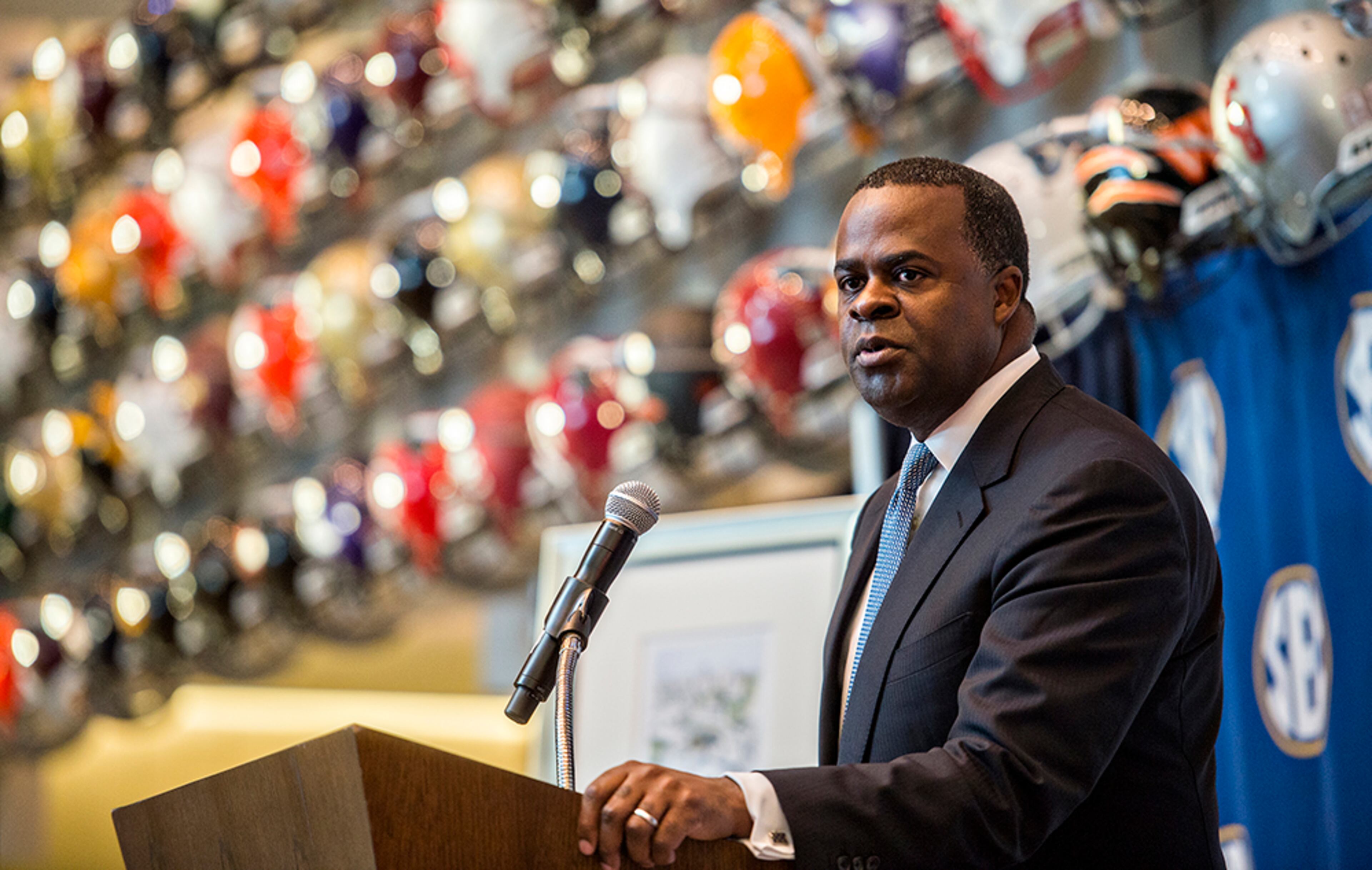
In the years following Reed’s administration, a number of his highest ranking Cabinet members were sentenced to years in prison and thousands in fines as a result of a yearslong federal corruption investigation into bribery and fraud.
Reed was never charged and is quick to point fingers at the convicted staff members or his predecessors who appointed them. He contends he was unscathed by the scandal, although he lost his bid for a historic third term in office to a lesser-known council member.
“Yet I raised more and had more financial support than anybody who’s ever run for the job,” he pushed back. “Despite what has happened in the federal investigation, I’ll put my wins up against anybody that’s had this job.”

THE ACCIDENTAL MAYOR
Keisha Lance Bottoms | 2018-2022
Keisha Lance Bottoms was thrust back into the political spotlight last month when President Donald Trump, within the first 24 hours of his second term, took to his far-right social media site to announce Bottoms was “FIRED” from her position on the trade council in the Biden administration.
It was a declaration she knew was coming, so two weeks before Trump returned to office, she preemptively resigned. Her counterattack ran rampant in the media, although her back-and-forth with the controversial president was nothing new.
In the high-ceilinged living room of her southwest Atlanta home, Bottoms, 55, refers to herself as an “accidental politician.”
The former City Council member and Magistrate Court judge went on to become one of the most recognizable political figures nationwide during her term as she navigated a fire hose of emergencies.
From the beginning, her transition into the mayor’s office was overshadowed by the looming federal investigation of Mayor Kasim Reed’s administration. And near the first 100-days mark of her service, she demanded the resignations of her entire Cabinet. Hackers also crippled the city’s computer system, costing millions to get it back under control.
Then the COVID-19 pandemic hit. Emory professor and biomedical scientist Carlos del Rio gathered the mayor alongside Atlanta CEOs, hospital chiefs and university heads in a room and told them they had 24 to 48 hours to shut down the city before the virus ravaged residents.

When Trump suggested Americans inject themselves with bleach to protect themselves from the virus and Gov. Brian Kemp demanded business reopen, Bottoms knew she was on her own in handling the deadly pandemic.
“We made the best decisions that we knew to make at that time, and those decisions, I truly believe, helped save lives in our city,” Bottoms said five years later. “We were following the science.”
But Bottoms’ mayoral term was plagued with extraordinary challenges over and over again.
The image of an Atlanta police patrol car engulfed in flames outside of CNN Center, a stone’s throw from Centennial Olympic Park, is seared into her mind.
The burning police car was the result of a 2020 protest against police violence that ended in chaos, leaving parts of the city in flames, and shops and restaurants ransacked by looters.
At the same time the mother of four was having tough conversations about police brutality at home with her young teenagers, she was staring down the lens of a news camera at the public safety headquarters on Peachtree Street, begging protesters to go home and enlisting the help of iconic Atlanta rappers Killer Mike and T.I. to echo her pleas.

But nothing was more devastating to Bottoms than the death of 8-year-old Secoriea Turner, who was shot while in an SUV with her mother and a friend riding past a protest at the Wendy’s where Rayshard Brooks, a 27-year-old Black man, was killed by police.
Bottoms had wanted to tear down the fast-food restaurant after Brooks’ death to put an end to the demonstrations, but local elected officials encouraged her to wait while they worked to disperse the protests.
“I agreed to give it a few more days, and so you can’t help but wonder, if we had done something differently, would there have been a different outcome.”

Her headline-worthy criticism of Trump and handling of the demonstrations propelled her into the national spotlight and made her a key ally to the incoming Biden administration. Once Joe Biden took office, he headlined a fundraiser for Bottoms and raised more than $500,000 toward her reelection bid.
But in the end, she decided not to run again and took an opportunity to join Biden’s White House as a senior adviser and director of public engagement. And so she became the first modern-era Atlanta mayor to not seek a second term in office.
“I’m sure there’s some things that I could have done better, but I didn’t feel like I came in with a clean slate,” she said “I felt there was just a lot of unfair criticism, and I do believe being a woman ― being a Black woman ― I think played into it.”
Bottoms is reportedly eyeing a bid for governor these days.

THE ENGINEER
Andre Dickens | 2022-Present
When Andre Dickens was elected to serve as Atlanta’s 61st mayor, he had something to prove.
The Adamsville native inched into a runoff by less than 600 votes after a crowded general election race that was dominated by two other candidates with more political capital and way more money.
The media had all but ignored the City Council member and other lesser-known candidates for months while former Mayor Kasim Reed ― who was eying a historic third term ― butted heads with City Council President Felicia Moore.
Initially, Dickens’ internal polling was abysmal. Despite the disappointing numbers, voters experienced a dramatic change of heart, and he would go on to win the runoff with 64% of the vote, the largest margin for an open mayor’s race since 1993.

“I fully believe that I was supposed to be the mayor of Atlanta for that exact moment,” he said under the gold cast of the city seal in the mayoral office three years later. It was something Dickens had believed since he was 16 years old, a dream he shared with his longtime friend and mentor, Shirley Franklin.
Dickens recalls walking into Benjamin E. Mays High School every day with a book bag slung across his back and seeing three portraits of “two white dudes in a suit and a Black dude in a suit.” That image of Andrew Young alongside the president and governor cemented Dickens’ mayoral aspirations.
When he took office, Dickens had a long to-do list that included living up to his lofty campaign promises of bolstering the city’s affordable housing stock and tackling crime rates that had spiked during the COVID-19 pandemic.
But first, he had to stop Atlanta from splitting apart. As the city neared 50 consecutive years of Black leadership, residents in the whitest and wealthiest part of Atlanta were leading an effort to break off and establish Buckhead City.

Dickens worked quickly to mend the fractured relationship between Atlanta leadership and Republican state officials that was at an all-time low during the previous administration.
The mayor feels strongly it’s better to know what Republican lawmakers are up to rather than read about it in the newspaper the next day. It’s a personality trait of the politician, who earned a chemical engineering degree from Georgia Institute of Technology. Praised for his big-picture thinking, Dickens likes to know all the chess pieces in play.
Bring me the bad news early, he directs his staff.

There was plenty of it early in his term when an emotional and often violent battle ensued over the construction of the 85-acre Atlanta Public Safety Training Center. Dickens inherited the project from his predecessor, but he voted in favor of it when he was on City Council.
The project sowed deep distrust in communities that border the project, and the city faced criticism when news broke it wasn’t being completely transparent over the inflated price tag.
The death of a protester shot and killed by police also made national headlines, and a massive protest on Constitution Road near the center ended with police using tear gas and flash-bang grenades to disperse the crowd.
Dickens believes social media played a large role in the opposition. During his term, he has struggled to get ahead of what he says is misinformation and half-truths that have spread exponentially across X, formerly called Twitter, and Instagram. He’s been known to message naysayers directly in an attempt to mitigate falsehoods.
But at the same time the project was under scrutiny, the city saw a drop in homicides by a record 21% in 2023 and another 6% in 2024. And Atlanta landed a series of large-scale events including World Cup matches in 2026 that are expected to bring 300,000 visitors to the city.

On the campaign trail, Dickens promised to create or preserve 20,000 units of affordable housing by 2030, and he has seen success toward hitting those goals with innovative projects like The Melody, a shipping container community downtown.
Dickens, who has announced his bid for a second term, is in the unusual position of having an unprecedented number of living Black mayors watching his every move. And they aren’t afraid to voice their opinions and make news of their own — Shirley Franklin and Bill Campbell are the most vocal, he said with a laugh. But Dickens takes it in stride.
“They care so deeply,” he said.
ABOUT THIS SERIES
This year’s AJC Black History Month series, marking its 10th year, focuses on the role African Americans played in building Atlanta and the overwhelming influence that has had on American culture. These daily offerings appear throughout February in the paper and on AJC.com and AJC.com/news/atlanta-black-history.
Become a member of UATL for more stories like this in our free newsletter and other membership benefits.
Follow UATL on Facebook, on X, TikTok and Instagram.
